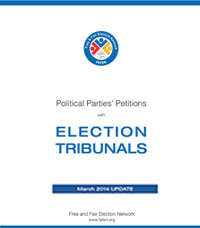ISLAMABAD, March 31, 2014: The election tribunals established by the Election Commission of Pakistan (ECP) to redress post-election disputes have fallen behind the legally-stipulated deadline to dispose of petitions in 184 out of the 190 pending cases, says the Free and Fair Election Network (FAFEN) in a press release issued on Monday.
As of February 28, 2014, only 54% (220 out of 410) of the post-election disputes were decided by the tribunals and the ECP (195 out of 385 by tribunals and 25 by ECP). The tribunal in Dera Ismail Khan has become the first to dispose of all the 13 petitions referred by the ECP and its judge is now hearing some of the petitions filed with the Peshawar tribunal.
The ECP constituted 14 tribunals across the country following the General Elections 2013 to redress election-related complaints of contesting candidates. The ECP received 409 petitions, while one petition was filed directly with the Lahore tribunal.
The current pace at which the tribunals are operating has already delayed the dismissal of 184 (97%) out of 190 cases pending with the tribunals. FAFEN observers have recorded 1,936 adjournments of over seven days in the tribunals, in violation of election laws and the ECP’s directions which urge the tribunals to hear the petitions on a day-to-day basis and do not allow an adjournment of more than seven days.
The election tribunals are legally bound to decide a petition within 120 days of their receipt. The ECP can accept petitions within 45 days of the gazette notification of the returned candidates and can either dismiss or forward a petition to the respective tribunal at a time it may deem fit after initial scrutiny. The ECP started referring the petitions to the tribunals in June 2013. As there is no time limit for ECP to forward or dismiss the petitions, some cases remained pending with the commission for more than 120 days. According to the data collected by FAFEN observers, the Lahore tribunal received at least two petitions on January 29, 2014.
The petitions forwarded to the tribunals are moved on a single or multiple grounds seeking single or multiple reliefs. A majority of the petitions challenged the nomination or qualification of returned candidates with the additional ground of use of corrupt practices to sway the elections. Most of the petitions (99) were filed by independent candidates, followed by PML-N members 66 petitions, PTI members 58 and PPPP members 50 petitions.
PML-N – the party with the maximum seats in the National Assembly – had the highest number of petitions filed against its winning candidates. According to data available with FAFEN observers, over one-third (138 or 35%) of the 385 petitions were filed against the party’s winning candidates. Most of the petitions were filed in Punjab (115), with 49 petitions being filed in Lahore followed by Faisalabad (27), Bahawalpur (19) and Multan (14). No petitions were filed against PML-N candidates in Dera Ismail Khan and Hyderabad. PPPP’s returned candidates were nominated in 49 petitions – mostly in Sindh with 25 petitions being filed in Hyderabad and 18 in Sukkur.


